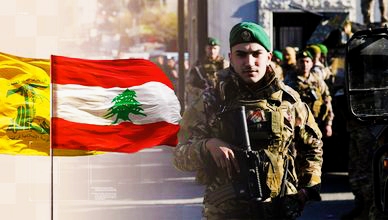Lebanon is awaiting an important government session tomorrow, Monday, at the presidential palace chaired by President Joseph Aoun, where the Lebanese army will present its first official report on the implementation of the weapons control plan, based on what was agreed upon in the government session on September 5.
This report comes after a field tour by the army commander, General Rudolf Haikal, in southern Lebanon, during which he emphasized the necessity of the complete redeployment of the Lebanese army to assert state authority and restore stability in the southern regions.
The anticipated report will not be limited to the area south of the Litani River but will extend to include areas north of the Litani, according to sources.
The Minister of Displaced Persons and Minister of State for Technology Affairs, Kamel Shhadeh, confirmed in exclusive statements that this report represents a fundamental step in implementing the government's decision to control weapons and prevent their transfer across all Lebanese territories, pointing out that the international community is closely monitoring the implementation of this plan in all regions, not just south of the Litani.
Shhadeh indicated that the first phase of the weapons control plan is divided into two parts: the first focuses on the area south of the Litani, and the second relates to controlling the manifestations of weapons throughout Lebanon, including weapons in Palestinian camps and those of political parties, including Hezbollah's weapons.
He noted that the ministers in tomorrow's session will pose many questions to the army leadership during the report presentation, expressing hope for clear answers that support the government's diplomatic efforts to gather the necessary support for the army.
In a related context, the administration of President Donald Trump approved this week to provide $230 million in aid to Lebanese security forces, of which $194 million is allocated to the army, including military equipment and training courses.
Official sources confirmed that supporting the army and enabling it to assert its authority in terms of numbers and equipment is a priority for the American administration, and that there are no American conditions for arming the army, which must be the sole responsible entity for maintaining security throughout Lebanon.
Minister Kamel Shhadeh explained that the substantial American aid reflects great confidence in the Lebanese army, expressing hope that the first report on weapons control will provide an opportunity for friendly countries to organize support conferences to provide logistical and financial assistance and necessary training programs for military personnel to perform their duties effectively.
The Cabinet welcomed the army's plan for weapons control, named "Shield of the Nation," during its session on September 5, which consists of five phases starting with the area south of the Litani, then the area between the Litani River and the Awali River, followed by Beirut and its suburbs, then the Bekaa, concluding with the fifth phase that encompasses all Lebanese territories.
However, Israeli occupation points in the south (more than 5 points) still hinder the complete deployment of the army in the area south of the Litani, while Lebanon relies on American mediation to implement the weapons control plan and fully activate UN Resolution 1701, which enhances the sovereignty and security of the Lebanese state.

